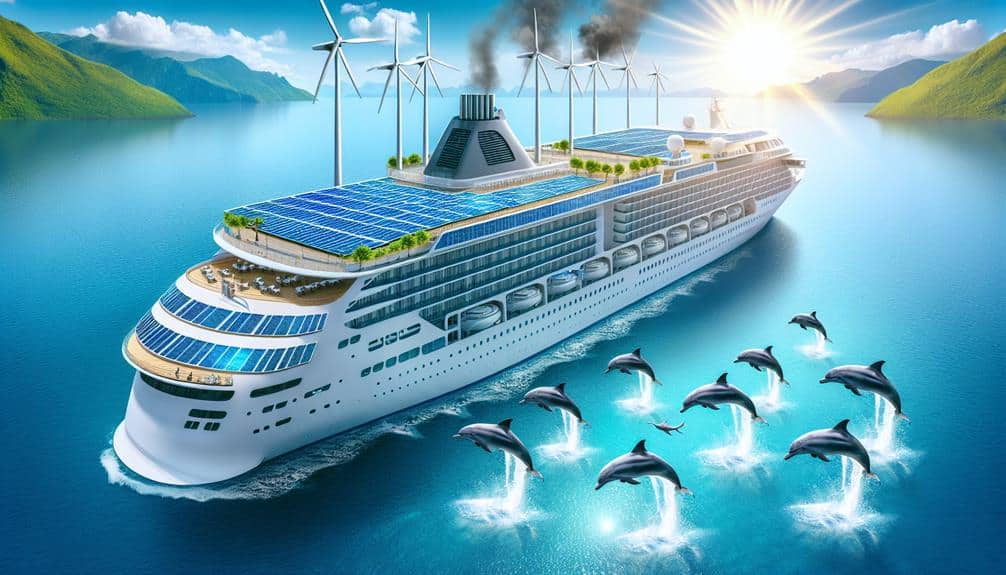Cruise lines prioritize environmental sustainability due to increasing demand for eco-friendly practices driven by passenger preferences and industry trends. They integrate sustainable initiatives to meet customer expectations and attract environmentally conscious travelers. Focus on reducing emissions, waste management, and eco-friendly technologies minimizes environmental impact. Millennials, valuing sustainability, further influence these efforts. Eco-friendly cruising not only benefits the environment but also presents economic advantages and boosts brand image.Understanding how cruise lines adapt to sustainable practices can give insight into the broader industry transformations and evolving consumer preferences.
Key Points
- Meeting growing demand for sustainable practices from travelers.
- Responding to passenger preferences for eco-friendly options.
- Integrating green initiatives into operations to attract environmentally conscious passengers.
- Adapting to industry trends emphasizing corporate responsibility.
- Benefiting from economic, social, and environmental advantages of eco-friendly cruising.
Growing Demand for Sustainable Practices
As travelers become more environmentally conscious, they're increasingly demanding sustainable practices from cruise lines. Industry trends indicate a shifting focus towards corporate responsibility in response to this demand. Cruise lines are recognizing the importance of integrating sustainable initiatives into their operations to meet customer expectations and align with global sustainability goals. According to recent data, there's been a notable increase in consumers choosing cruise lines that prioritize environmental sustainability. This shift in consumer preferences has prompted the industry to adopt eco-friendly practices such as reducing single-use plastics, implementing advanced wastewater treatment systems, and investing in cleaner fuel technologies.
Corporate responsibility has become a significant driver for cruise lines to enhance their environmental performance. Companies are realizing that sustainable practices not only benefit the environment but also contribute to long-term profitability and reputation management. As more cruise lines embrace sustainability as a core value, the industry as a whole is experiencing a paradigm shift towards more eco-conscious operations. This strategic approach not only meets the evolving demands of passengers but also positions cruise lines as responsible stewards of the environment.
Impact of Passenger Preferences
Passenger preferences greatly influence the environmental sustainability strategies adopted by cruise lines. Understanding passenger behavior is key for cruise lines to align their offerings with industry trends towards sustainability. Recent studies have shown a significant shift in consumer preferences, with more passengers actively seeking eco-friendly cruise options. This shift is driving cruise lines to prioritize sustainability in response to the growing demand for environmentally responsible practices.
Passenger behavior data indicates that a considerable percentage of travelers are willing to pay a premium for cruises that prioritize sustainability. This willingness to pay more for eco-friendly practices is a clear indicator of the impact passenger preferences have on shaping the industry. Cruise lines are increasingly considering these trends when designing their ships, services, and itineraries to meet the expectations of environmentally conscious passengers.
Green Initiatives on Cruise Ships
The growing demand for eco-friendly cruise options has prompted cruise lines to implement various green initiatives on their ships. One key focus area for these initiatives is reducing emissions. Cruise companies are investing in technologies such as scrubbers and liquefied natural gas (LNG) propulsion systems to lower their carbon footprint. By utilizing these advanced systems, cruise ships can greatly decrease the amount of harmful gases released into the atmosphere during voyages.
In addition to reducing emissions, waste management is another critical aspect of green initiatives on cruise ships. To tackle this issue, cruise lines are implementing advanced waste treatment systems that can efficiently process and recycle waste generated on board. By segregating and treating waste streams, these systems help minimize the environmental impact of cruise operations and guarantee responsible disposal practices.
Influence of Millennial Travelers
Millennial travelers have a substantial impact on the cruise industry's sustainability efforts through their preferences and expectations for environmentally conscious practices. This influential demographic segment values sustainable travel trends, pushing cruise lines to adopt eco-friendly measures. Research indicates that 87% of millennials are willing to spend more on travel experiences that prioritize sustainability. As a result, cruise companies are increasingly focusing on reducing their carbon footprint, improving waste management, and investing in alternative energy sources to meet the demands of this environmentally-conscious generation.
Moreover, millennials are actively seeking out cruise options that align with their values, leading to a shift in the industry towards more sustainable practices. For instance, there's a growing preference for cruises that prioritize recycling, minimize single-use plastics, and support local conservation efforts. By catering to millennial influence, cruise lines not only enhance their environmental credibility but also attract a key market segment that's driving the demand for sustainable travel experiences. This shift in consumer preferences is compelling cruise companies to integrate eco-friendly initiatives into their operations to remain competitive in the evolving travel landscape.
Benefits of Eco-Friendly Cruising
With the increasing focus on sustainability in the cruise industry, the benefits of eco-friendly cruising extend beyond just environmental impact to encompass economic and social advantages as well. Reduced emissions from eco-friendly cruise ships play a significant role in minimizing air pollution and combating climate change. According to a study by the Environmental Protection Agency (EPA), cruise ships that adopt eco-friendly practices can decrease greenhouse gas emissions by up to 30%.
Furthermore, the emphasis on ocean conservation through eco-friendly cruising helps safeguard marine ecosystems and wildlife. By utilizing advanced wastewater treatment systems and implementing sustainable waste management practices, cruise lines contribute to preserving the health of the oceans. This not only benefits marine biodiversity but also secures the long-term sustainability of the tourism industry that heavily relies on the health of ocean ecosystems.
In addition to environmental benefits, eco-friendly cruising can lead to cost savings for cruise lines in the long run. By investing in energy-efficient technologies and alternative fuels, cruise companies can lower operational costs and enhance their overall competitiveness in the market. Additionally, promoting eco-friendly initiatives can attract environmentally-conscious travelers, thereby enhancing the company's brand image and social responsibility profile.
Frequently Asked Questions
How Do Cruise Lines Handle Waste Management and Recycling on Board Their Ships?
Onboard ships, cruise lines handle waste management effectively through a thorough recycling program. Sustainability initiatives drive these efforts, ensuring minimal environmental impact. By segregating waste, recycling materials, and investing in eco-friendly practices, cruise lines prioritize responsible waste management.
What Measures Are in Place to Reduce Air and Water Pollution From Cruise Ships?
To reduce air and water pollution, cruise lines are implementing measures like renewable energy adoption and emission controls. These strategies aim to minimize environmental impact and enhance sustainability efforts within the industry.
Are There Any Regulations or Standards in Place to Ensure Cruise Lines Are Following Environmentally Sustainable Practices?
To guarantee cruise lines follow environmentally sustainable practices, regulations mandate green technology adoption. Compliance monitoring verifies adherence. Industry partnerships drive innovation, while sustainable sourcing secures eco-friendly supplies. Embracing these standards fosters a greener future for cruising.
How Do Cruise Lines Offset Their Carbon Footprint From Operating Their Ships?
To offset their carbon footprint, cruise lines utilize sustainable fuels like LNG and invest in carbon offsetting projects. These efforts help minimize environmental impact, aligning with their commitment to sustainability and reducing emissions from ship operations.
What Efforts Are Being Made to Protect Marine Wildlife and Ecosystems in Areas Where Cruise Ships Operate?
To safeguard marine wildlife and ecosystems in areas cruise ships operate, measures like establishing marine protected areas and funding coral reef conservation projects are essential. Sustainable fishing practices and habitat restoration efforts also play significant roles in protecting these delicate environments.




